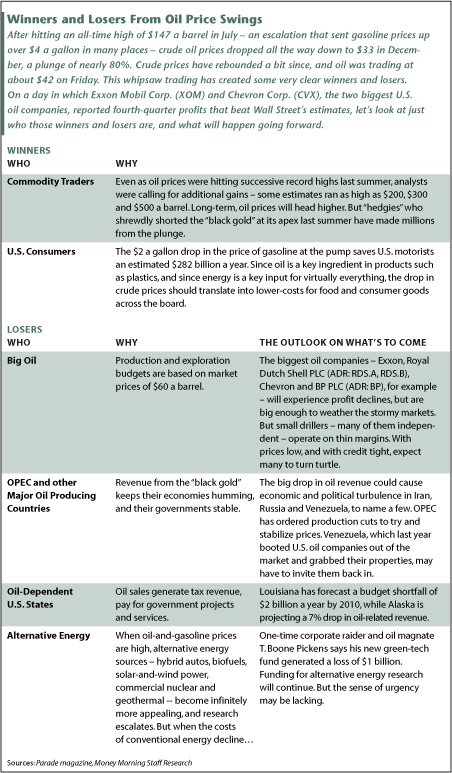By Don Miller
Associate Editor
Money Morning
Exxon Mobil Corp. (XOM) reported the biggest annual corporate profit in U.S. history on Friday, even as crude oil prices plummeted from summer highs, pummeling comparable fourth-quarter earnings by 33%.
Exxon reported profits of $45.2 billion for 2008, continuing an epic run that investors have almost come to expect from the petro-giant. The previous record for annual profit was $40.6 billion, set by Exxon in 2007.
"The results speak for themselves," Fred Burke, president of Johnston Lemon Asset Management in Washington, D.C, told Reuters. "I still think Exxon is a low-cost producer, and at some point the price of oil will increase. They are doing all the right things right now."
Of course, that doesn't mean Exxon is wholly insulated from the global slowdown that has caused crude prices to plummet 70% from last year's record high $147 a barrel.
Net income slid sharply to $7.8 billion, or $1.55 a share, in the October-December quarter. That compared to $11.7 billion, or $2.13 a share, in the same period a year ago, when Exxon set a U.S. record for quarterly profit.
Still, as other smaller oil companies struggle with crude prices that are well below the cost of production, Exxon continues to make the best of a bad situation.
The company posted stellar results at its refining and marketing unit, where earnings jumped 6% as result of low crude prices and higher profit margins.
Exxon ranks third in U.S. refining capacity, and could fast become a global leader as it plans to build on its overseas operations.
"The companies that have significant overseas refining can capitalize because outside the U.S., diesel demand has remained relatively strong," Douglas Ober, who manages $540 million, including Exxon shares, as chairman of Petroleum & Resources Corp., told Bloomberg News. "It was an impressive quarter in a difficult environment."
The energy sector has been hit hard by the twin blows of the global credit crunch and oil and gas prices selling off. But large companies like Exxon, with piles of cash and diversified operations, are better suited to weather the downturn.
Exxon's results are also a signal that oil majors in general are holding up well in the amid the current financial chaos, said Ted Harper, who helps manage $9 billion at Frost Investment Advisors in Houston.

"It signals that these guys operated relatively well in what is probably going to be the first of several difficult quarters," Harper told Bloomberg. "You've got a pretty decent place to park some money for the time being."
Last year, Exxon spent almost $16 billion on capital expenditures and $32 billion on share buybacks. That has helped buoy stock prices over the past 12 months.
Shares of Exxon are have shed just 9% of their value in the past year. By comparison, the Dow Jones Industrial Average and Standard & Poor's 500 Index are down 36% and 38% respectively during the same period.
Exxon Mobil Chief Executive Officer Rex Tillerson said his company will buy back $7 billion in shares during the current quarter and boost capital spending by as much as $5 billion this year.
Industry analysts say Exxon is known for running its finance department with the same rigor it runs its offshore rigs.
"It has inherent efficiencies no other company can touch," Fadel Gheit, an oil analyst at Oppenheimer & Company, told The New York Times. "Exxon is the gold standard of the industry."
News and Related Story Links:
-
Reuters:
Exxon, Chevron profits top view
-
New York Times:
Exxon Mobil Corporation


